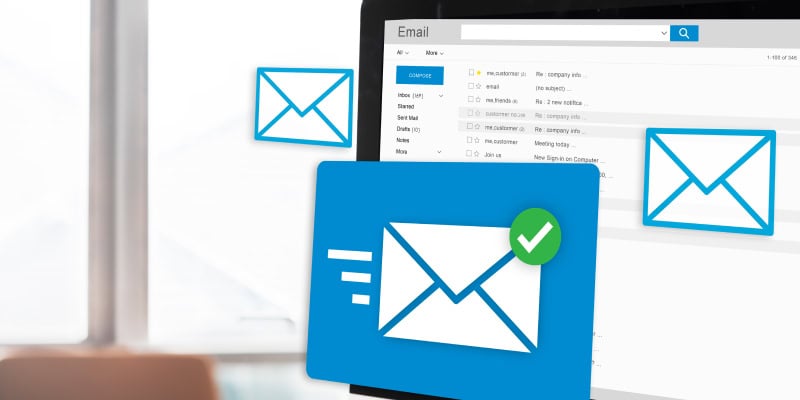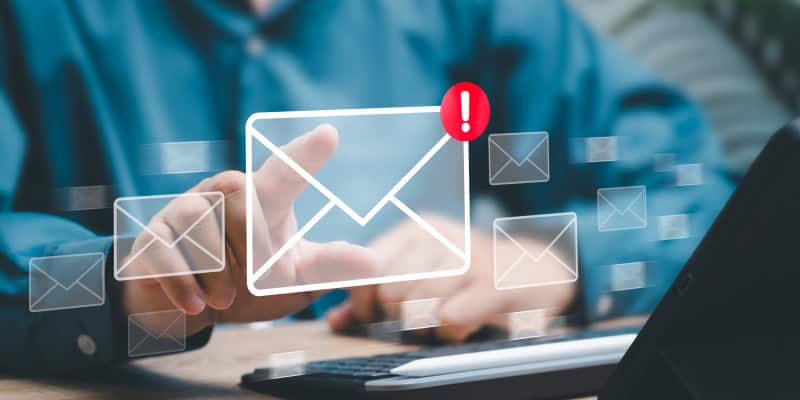Email compliance is a top priority, whether you are a big player or an upcoming firm in the business landscape. It protects your firm’s good name and secures your clients’ trust. Knowing the rules of email use is vital. It can save you from hefty fines and help keep your customers loyal.
CMIT Solutions, the top name for cybersecurity support services in Tempe, shows you five key steps for complete email rule-following, strengthening your commitment to top-notch talks.
Understanding Email Compliance for SMBs
Communication via email is key for talking to clients and showing off your goods or services. But, how many SMBs understand the need for email rule following? These are the dos and don’ts that keep your email safe and spam-free. It means playing fair to shield your firm and clients.
Email rules are not just for the giants. They are a duty for all, from the top boss to the new joiner. Everyone must help keep your email safe and sound.
The web of these rules can seem scary, and it is tougher for smaller firms without big resources. However, for SMBs, following email laws is vital. It keeps your client’s information safe and builds trust. By adhering to these laws, you respect client privacy and boost their faith in your brand.
The rules for email compliance vary by field and place, so you must be alert and ready to learn the laws for your business. One rule you can’t skip is saving all your emails. This mandatory rule keeps you prepared for any legal questions that may come.
Ignoring email rules can result in hefty fines and a stained reputation. Breaking these rules can also shake client trust and hurt profits.
Keeping your client’s information and your firm’s future safe is a top priority, and email compliance is key to that. Teaming up with IT professionals ensures your email ads and daily communications are on the same level, easing your mind and letting you focus on growing your firm.
Considering these duties, it is key to know the legal risks and steer through them with care.
Navigating Five Crucial Legal Risks in Email Compliance
1. GDPR in Email Compliance
Small firms must be aware of GDPR compliance when using emails, especially when handling EU citizens’ data.
The General Data Protection Regulation (GDPR) applies to any company that handles the personal data of EU citizens. It requires clear consent for data usage and grants individuals the right to control their data. Non-adherence to the GDPR can cost you up to 20 million euros or 4% of your yearly sales for the worst breaks.
2. CAN-SPAM Regulations
The CAN-SPAM Act allows businesses to send promotional emails without prior consent but requires a visible opt-out option. This Act can fine you up to $50,1120 for each email that breaks the rules.
3. CASL
Canada’s Anti-Spam Legislation (CASL) needs strong consent for email chats in Canada, including a clear way out and action on stop requests in ten days.
CASL requires a two-step opt-in process for some types of messages, along with clear sender information and an easy unsubscribe option.
The fines for not following CASL can be harsh, with up to $10 million for firms. And do not forget that rules like HIPAA might apply, too, depending on what your business does.
4. HIPAA, PCI DSS, and Industry Standards
Knowing rules like HIPAA and PCI DSS are key when you handle sensitive info like Personal Identifiable Information (PII) or Protected Health Information (PHI).
- HIPAA is a must for health firms to keep PHI safe.
- PCI DSS keeps credit card data safe for firms handling payments.
Following these rules is a must, not just to dodge legal trouble but also to keep your client’s trust. Expert advice is priceless in handling these duties well.
5. CCPA
The California Consumer Privacy Act (CCPA) protects Californians’ privacy rights, allowing them to see their personal information and request that it be deleted.
Practical Steps to Ensure Email Compliance
Making sure your email ways follow the rules can seem tough. Here are some simple steps to help:
- Find out which rules your firm must follow, like GDPR, CAN-SPAM, CASL, and CCPA.
- Educate your staff about email compliance and which ones affect your business.
- Keep up with changes in email laws and change your plans as needed.
Rule following is an ongoing task, and staying up to date is key to keeping your business and clients safe. With a solid base in email compliance, you will be better set to handle the changing world of email rules.
Setting Protocols and Identifying Email Regulations
Establishing clear procedures to ensure compliance with these rules is important. This can include developing plans for obtaining consent, managing opt-out requests, and safeguarding personal information.
Implementing these measures can enhance your email communications with robust data protection and security practices. This demonstrates your firm’s ongoing commitment to regulatory compliance and building trust with clients.
Email Archiving Strategies for Data Protection
Email archiving is a crucial aspect of data management that safeguards against data loss and is fundamental for legal readiness. Not only is it important for complying with legal regulations, but it is also essential for maintaining the integrity of your business data.
By leveraging technology that automates the archiving process and simplifies data retrieval, you can position your business to succeed. These systems, which are often secured with secret codes, ensure that sensitive information is kept safe, underscoring the need for Data Protection and Backup services.
Training Employees on Email Compliance Protocols
Email compliance and protocol training give your staff a clear map of handling sensitive data and facing threats. With the right ongoing IT guidance, these become real steps that your team can trust and follow.
As you prioritize teaching and team up with experts, you take active steps to protect your business from the risks of not following rules.
Ongoing Management of Email Security
To keep your firm safe from cybersecurity issues, it is key to keep an eye on data leaks and put in place measures to stop them from happening.
Implementing DLP Measures to Prevent Data Leaks
To boost your firm’s defense against data leaks, think about these Data Loss Prevention (DLP) measures:
- Build a safety culture in your firm to show how key it is to protect sensitive info.
- Limit access to sensitive data to only those who need it for their work.
- Use secret codes for emails with private info to keep out uninvited eyes.
- Do regular safety inspections to find and fix weak spots in your email systems.
Staying ahead of data leaks and fixing any losses helps build trust with your clients and allies. The threat world keeps changing, and your email safety steps should be ready and able to change to keep your businesss data whole.
Ensuring Compliance with Regular Email Policy Reviews
It is important to review your email plans regularly to ensure compliance with the latest rules. Email regulations change frequently, so it is necessary to stay alert and be ready for any new rules or changes to old ones.
Regular email plan reviews are crucial to identify deviations from the standards and take corrective action as required. This process is critical to safeguarding your client data and protecting your business from legal and financial repercussions.
To stay up-to-date with the latest email regulations, you can subscribe to industry newsletters, attend webinars, and consult legal experts specializing in data privacy and security. These sources provide a steady stream of updated information to help you keep your plans compliant with the latest rules.
As you think about the need to keep up with email rules, remember that knowing is having power.
For more views on this topic, check out – Staying Informed on Email Security Threats. This blog can give you more background and tips for keeping your firm safe from new threats.
Securing Your Business’s Future Through Vigilant Email Practices
Compliance is more than a checklist. It shows how much you care about privacy and fair play. While keeping up with rules requires focus and work, it boosts the trust your clients have in your brand.
CMIT Solutions, the foremost IT support provider in Tempe, offers the knowledge to help you in cyber safety and data care. Meeting email rules shows your promise to data truth and paints your firm as a responsible player in today’s tech-driven market.
FAQs
What kind of training do employees need for proper email compliance?
- Understanding that emails are permanent and can be accidentally shared.
- Double-check recipient lists before sending emails.
- Avoid sending messages in anger and seek second opinions when necessary.
- Use email for professional communication, preferring verbal discussions for big ideas or news.
- Apply urgency flags and CC/BCC options judiciously to respect privacy and relevance.
What are the consequences of not adhering to email compliance regulations for a business?
- Financial penalties include costly fines ranging into millions of dollars or a percentage of global turnover.
- Legal actions and lawsuits leading to additional financial burdens and disruptions.
- Reputational damage that undermines trust with customers and partners.
- Operational impacts like shutdowns or ceasing of certain business activities.
- Likelihood of increased scrutiny and oversight from regulatory bodies, possibly leading to more stringent operational constraints.
- Required corrective action plans that can be expensive and time-consuming to implement.
What should an SMB look for when choosing Cybersecurity Support Services for email compliance?
- Assess cybersecurity needs considering business size, data sensitivity, and compliance requirements.
- Understand available solutions like antiviruses, firewalls, and intrusion detection systems.
- Evaluate the benefits of cloud-based cybersecurity tools.
- Prioritize endpoint security to protect against malware and data breaches.
- Seek multi-layered, comprehensive cybersecurity solutions.
- Research vendors’ reputations, customer support, and security update responsiveness.
- Ensure solutions are scalable for future growth.
- Maintain awareness of new threats and best practices.
Our IT Services
| Managed IT Services | Cybersecurity | Productivity Applications |
| IT Support | Cloud Services | Network Management |
| Compliance | Data Backup | Unified Communications |
| IT Guidance | IT Procurement |



